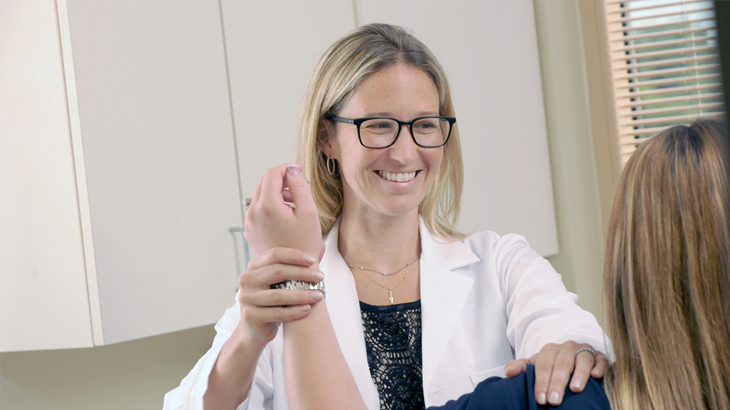Rotator cuff tear

A variety of conditions and injuries can damage the rotator cuff, cause shoulder pain, and make it difficult for you to move your arm. Rotator cuff injuries and tears occur in a spectrum that ranges from tendonitis to shoulder dislocation to partial tears to full tears. Full rotator cuff tears are most often the result of repetitive lifting or overhead activities using the arm.
However, rotator cuff tears and shoulder instability can occur without a specific injury as we age. Conservative, non-surgical treatment is successful in the majority of rotator cuff injuries, including physical therapy. When conservative measures are not successful, arthroscopic surgery may be necessary to treat and repair the cuff tear, thus leading to a comfortable, strong shoulder.
Rotator cuff tear with shoulder arthritis
Often, you can experience shoulder arthritis with rotator cuff injuries. The rotator cuff is the group of muscles that hold your shoulder in place and allow you to move your arm in different directions. If you suffer from both conditions at the same time, a reverse total shoulder replacement may provide the most relief.
Failed previous rotator cuff surgery
Rotator cuff repair is performed commonly to address pain and shoulder dysfunction after prior rotator cuff injuries or tears. Recurrent or persistent tears are common after rotator cuff repair. The causes of failed rotator cuff surgery include biologic factors, technical errors, and traumatic failure. A thorough history, physical examination, and appropriate imaging are required to determine if a patient is an appropriate candidate for revision rotator cuff repair or if a different type of intervention, such as a total joint replacement would be more beneficial.
When Severe Rotator Cuff Tears Lead to Reverse Shoulder Replacement

Our providers
Location: Change location Enter your location
Shoulder and Elbow Orthopedic Surgery
-
Ryan A Hoffman, MD
Shoulder And Elbow Orthopedic Surgery
-
Anand Murugan Murthi, MD
Shoulder And Elbow Orthopedic Surgery
-
Jason Andrew Stein, MD
Shoulder And Elbow Orthopedic Surgery
-
Brent Wiesel, MD
Shoulder And Elbow Orthopedic Surgery
-
Christopher Lee Forthman, MD
Shoulder And Elbow Orthopedic Surgery & Hand Surgery
Orthopedic Sports Medicine
-
Emmanuel Asare O Atiemo, MD
Orthopedic Sports Medicine
-
Vestinia Madonna Bridges, MD
Orthopedic Sports Medicine
-
Leigh Ann Curl, MD
Sports Medicine & Orthopedic Sports Medicine
-
Wiemi Abell Douoguih, MD
Orthopedic Sports Medicine
-
Allison Liefeld Fillar, MD
Sports Medicine, Orthopedic Sports Medicine & Orthopedic Surgery
-
Jason Wilson Hammond, MD
Sports Medicine, Orthopedic Sports Medicine & Orthopedic Surgery
-
Daniel Mark Hampton, MD
Sports Medicine, Ankle Orthopedic Surgery, Shoulder Orthopedic Surgery, Orthopedic Surgery, Knee Orthopedic Surgery, Hip And Knee Orthopedic Surgery, Hip Orthopedic Surgery & Orthopedic Sports Medicine
-
Richard Yarborough Hinton, MD
Pediatric Sports Medicine, Shoulder Orthopedic Surgery, Knee Orthopedic Surgery, Sports Medicine & Orthopedic Sports Medicine
-
John Anthony Kuri, MD
Orthopedic Sports Medicine
-
Richard Gary Levine, MD
Knee Orthopedic Surgery, Shoulder Orthopedic Surgery, Sports Medicine & Orthopedic Sports Medicine
-
Milford H Marchant, MD
Orthopedic Surgery, Orthopedic Sports Medicine & Sports Medicine
-
Carter Wallace Mitchell, MD
Orthopedic Sports Medicine
-
Ryan S. Murray, MD
Sports Medicine, Orthopedic Sports Medicine, Pediatric Sports Medicine & Pediatric Orthopedic Surgery
-
William Postma, MD
Orthopedic Sports Medicine
-
Kenneth Benjamin Tepper, MD
Orthopedic Sports Medicine & Sports Medicine
-
Melissa Ann Yadao, MD
Orthopedic Sports Medicine
Orthopedic Surgery
-
Dennis Carlini, MD
Orthopedic Surgery
-
David Ahron Cohen, MD
Orthopedic Surgery
-
David Larry Gold, MD
Orthopedic Surgery
-
Jason Wilson Hammond, MD
Sports Medicine, Orthopedic Sports Medicine & Orthopedic Surgery
-
Daniel Mark Hampton, MD
Sports Medicine, Ankle Orthopedic Surgery, Shoulder Orthopedic Surgery, Orthopedic Surgery, Knee Orthopedic Surgery, Hip And Knee Orthopedic Surgery, Hip Orthopedic Surgery & Orthopedic Sports Medicine
-
Mark David Hasenauer, MD
Hip And Knee Orthopedic Surgery & Orthopedic Surgery
-
Jessica B Hawken, MD
Orthopedic Surgery
-
Shaun Kumar Khosla, MD
Orthopedic Surgery
-
Milford H Marchant, MD
Orthopedic Surgery, Orthopedic Sports Medicine & Sports Medicine
-
Zan A Naseer, MD
Orthopedic Surgery
-
Colleen Bauk Balkam, MD
Orthopedic Surgery
-
Ira Dean Gelb, MD
Orthopedic Surgery
-
Charles Francis Mess, MD
Orthopedic Surgery
-
Charles Francis Mess, Jr., MD
Orthopedic Surgery
-
William Robert Volk, MD
Orthopedic Surgery
-
Bo Zhang, MD
Orthopedic Surgery









